 W
WAgamemnon's Daughter is a 2003 novella by the Albanian writer and the inaugural International Man Booker Prize winner Ismail Kadare. It is the first part of a diptych of which the second and longer part is The Successor. It is considered by many critics to be one of the author's greatest works.
 W
WThe Blinding Order is a short novel written by Ismail Kadare in 1984 and published in 1991, shortly after the collapse of the hoxhaist regime in Albania. Set in the 19th-century Ottoman Empire, The Blinding Order is a parable about the use of terror by authoritarian regimes, and it is linked through its main subplot to the author's banned 1981 novel The Palace of Dreams.
 W
WBroken April is a novel by award-winning Albanian author Ismail Kadare. Published in 1978, the book explores one of Kadare's recurring themes: how the past affects the present.
 W
WChronicle in Stone is a novel by Ismail Kadare. First published in Albanian in 1971, and sixteen years later in English translation, it describes life in a small Albanian city during World War II.
 W
WThe Concert is a 1988 historical novel by Ismail Kadare treating the events leading to the break in Albanian-Chinese diplomatic relations in the period 1972–78.
 W
WThe Dead River is the title of the first novel written by the 20th century Albanian writer Jakov Xoxa. One of the best-known of Jakov Xoxa's, the literary work was written in 1964 only to be published 7 years later.
 W
WThe Doll: A Portrait of My Mother is an autobiographical novel sketching author Ismail Kadare's relationship with his mother. It dwells upon the family's life in Gjirokastër and later in Tirana, "full of compelling details of life in a changing Albania", as well as on the author's own time as a student at the Gorky Institute in Moscow. While the portrait of his mother remains insubstantial, there are reflections upon the author's own youthful literary ambitions, and the nature of autocracy.
 W
WDoruntine or The Ghost Rider is a novel by Albanian writer Ismail Kadare. It is based on the old Albanian legend of Constantin and Doruntine.
 W
WElegy for Kosovo is an Albanian novel written by Ismail Kadare.
 W
WThe Fall of the Stone City is a 2008 novel by the Albanian writer Ismail Kadare. Apart from winning the Rexhai Surroi Prize for the best book of the year, in Kosovo; the novel was also shortlisted for the Independent Foreign Fiction Prize in 2013.
 W
WThe File on H. is a novel by the Albanian author Ismail Kadare. It first appeared in Albanian in 1981 under the title Dosja H.
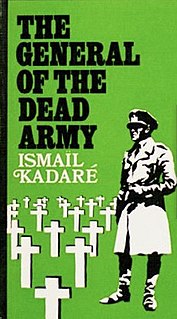 W
WThe General of the Dead Army is a 1963 novel by the Albanian writer Ismail Kadare. It is the author's most critically acclaimed novel. Kadare was encouraged to write the book by Drago Siliqi, literary critic and director of the state-owned publishing house Naim Frashëri.
 W
WA Girl in Exile: Requiem for Linda B. is a novel by Ismail Kadare. It has been described as "one of Kadare's best novels".
 W
WHasta La Vista is an Albanian novel written by Petro Marko in 1958. It widely encompasses the author's experience in the Spanish Civil War in which he was part of the International Brigades, Garibaldi Battalion.
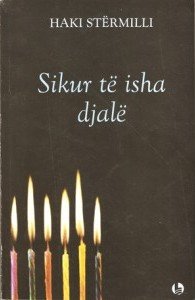 W
WIf I Were a Boy is an Albanian epistolary novel written by Haki Stërmilli in 1936. Written mostly in a form of diary entries it documents the struggle of the young female protagonist Dija to adjust in an Albanian patriarchal society, which was common during the time the novel was written in. Originally the novel was written in Gheg dialect.
 W
WThe Palace of Dreams is a 1981 novel by the Albanian writer Ismail Kadare. Set ostensibly in the Ottoman Empire, but in a deliberately imprecise past shaded by myth and intended to represent the modern totalitarian state, The Palace of Dreams follows the rapid rise of Mark-Alem, a young Ottoman Albanian related to the powerful Köprülü family, within the bureaucratic regime of the title palace, a shady ministry whose objective is to gather, examine and interpret the dreams of the empire's subjects in order to uncover the master-dreams, which are believed to shell the future destiny of the Sultan and the state.
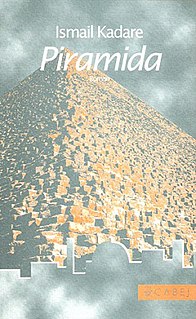 W
WThe Pyramid is a 1992 novel written by Ismail Kadare. It is considered to serve both literary and dissident purposes. It is a political allegory of absolute political power.
 W
WThe Rise and Fall of Comrade Zylo is an Albanian satiric novel written by Dritëro Agolli in 1972. It is Dritëro Agolli's most famous and critically acclaimed novel. The book was written during the communist regime in Albania, a time during which freedom of speech was very limited to non-existent. The composition of the whole book is similar to that of a report, record or official biography. Originally published in the satirical magazine Hosteni, it first appeared in book form in 1973.
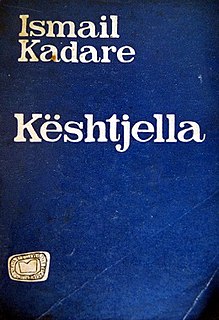 W
WThe Siege is a novel by Albanian author Ismail Kadare, first published in 1970 in Tirana as Kështjella. It tells about the Albanian-Ottoman war during the time of Skanderbeg. It was translated into French by Jusuf Vrioni and then from French into English by David Bellos under the title The Siege. Bellos in his afterword suggests that the book is patterned after Marin Barleti's work The Siege of Shkodra. The narrator of the novel is however not an Albanian but a member of the besieging Turkish army.
 W
WSpring Flowers, Spring Frost is a 2000 novel by Ismail Kadare set in the 1990s when feuding and vendetta had returned to the country after the fall of the communist regime. The English translation by David Bellos was first published by The Harvill Press in 2002, and then by Vintage Books in 2003. It was translated not directly from Albanian, but from the French translation by Jusuf Vrioni.
 W
WThe Successor is a 2003 novel by the Albanian writer and inaugural International Man Booker Prize winner Ismail Kadare. It is the second part of a diptych of which the first part is the novella Agamemnon's Daughter. The diptych is ranked by many critics among the author's greatest works.
 W
WThe Three Arched Bridge is a 1978 novel by Ismail Kadare. The story concerns a very old Albanian legend written in verses, the "Legjenda e Rozafes". The book differs greatly from the original legend as the legend calls for a castle that is being built, not a bridge.
 W
WThe Traitor's Niche is a historical novel by the Albanian author Ismail Kadare. It was first published in Tirana, Albania in 1978. The English translation by John Hodgson was published in 2017. It is part of a loose trilogy that includes The Three-Arched Bridge and The Palace of Dreams.
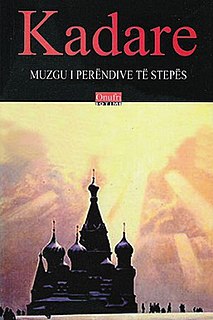 W
WTwilight of the Eastern Gods is a novel by the Albanian author Ismail Kadare. It was published in installments in Albania between 1962 and 1978, and published in full in 1981 in the French translation of Jusuf Vrioni. The English translation by David Bellos, published in 2014, was made from Vrioni's French.